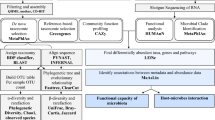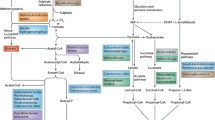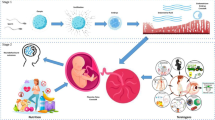Abstract
Background
The influence of maternal diet on offspring's health is an area of study that is linked to epigenetics. Maternal diet contributes to determining the health status of offspring and maternally linked mechanisms and is a global health challenge that requires attention. The impact of gut microbiota on host metabolism and offspring health is still not established.
Objective
In this review, we intend to discuss the evidence on the impact of maternal diet and the health of offspring gut microbiota. The paper focuses on the gut microbiome of animal models. It captures the maternal diet and its influence on the offspring's gut microbiota, behavior that is supported by cell experimental results. Both inflammation and immune status of offspring induced by maternal diet are discussed. Finally, this review used predicted biological pathways involved in maternal diet and offspring health, and the influence of maternal diet on gut microbiota and offspring behavior. Obesity, diabetes, asthma and allergies, and neurodegenerative disorders and prospects for maternal diet, and microbiota and offspring health were discussed.
Conclusion
The review was able to gather that a high-fat diet during pregnancy created a long-lasting metabolic signature on the infant's innate immune system, altering inflammation in the offspring microbiota, which predisposed offspring to obesity and metabolic diseases in adulthood.

Similar content being viewed by others
Data availability
Not applicable.
References
Melina V, Craig W, Levin S (2016) Position of the academy of nutrition and dietetics: vegetarian diets. J Acad Nutr Diet 116(12):1970–1980
Turnbaugh PJ et al (2006) An obesity-associated gut microbiome with increased capacity for energy harvest. Nature 444:1027–1031
Bajinka O, Darboe A, Tan Y et al (2020) Gut microbiota and the human physiological changes. Ann Microbiol 70:65
Chong CYL, Bloomfifield FH, Sullivan JM (2018) Factors affecting gastrointestinal microbiome development in neonates. Nutrients 10:274
Backhed F, Ding H, Wang T et al (2004) The gut microbiota as an environmental factor that regulates fat storage. Proc Natl Acad Sci USA 101(44):15718–15723
Tremaroli V, Backhed F (2012) Functional interactions between the gut microbiota and host metabolism. Nature 489:242–249
Bruce-Keller G, Annadora J, Fernandez-Kim J et al (2017) Maternal obese-Type gut microbiota differentially impact cognition, anxiety and compulsive behavior in male and female offspring in mice. PLoS ONE 4:1–20
Warren MF, Hallowell HA, Higgins KV et al (2019) Maternal dietary protein intake influences milk and offspring gut microbial diversity in a rat (Rattus norvegicus) model. Nutrients 7:1–11
Mann PE, Huynh K, Widmer G (2018) Maternal high fat diet and its consequence on the gut microbiome: A rat model. Gut Microbes 9(2):143–154
Zhou L, Xiao X, Zhang Q et al (2019) Gut microbiota might be a crucial factor in deciphering the metabolic benefits of perinatal genistein consumption in dams and adult female offspring. Food Funct 10(8):4505–4521
Huang YC, Huang LT, Sheen JM et al (2020) Resveratrol treatment improves the altered metabolism and related dysbiosis of gut programed by prenatal high-fat diet and postnatal high-fat diet exposure. J Nutr Biochem 75:108260
Xavier MJ, Roman SD, Aitken RJ et al (2019) Transgenerational inheritance: how impacts to the epigenetic and genetic information of parents affect offspring health. Hum Reprod Update 25(5):518–540
Santos SAA, Camargo ACL, Constantino FB et al (2020) Identification of potential molecular pathways involved in prostate carcinogenesis in offspring exposed to maternal malnutrition. Aging 12(20):19954–19978
Du JE, You YA, Kwon EJ et al (2020) Maternal malnutrition affects hepatic metabolism through decreased hepatic taurine levels and changes in HNF4A methylation. Int J Mol Sci 21(23):9060
Hasebe K, Kendig MD, Morris MJ (2021) Mechanisms underlying the cognitive and behavioural effects of maternal obesity. Nutrients 13(1):240
Yang K, Zhu J, Wu J et al (2021) Maternal Vitamin D Deficiency Increases Intestinal Permeability and Programs Wnt/β-Catenin Pathway in BALB/C Mice. JPEN J Parenter Enteral Nutr 45(1):102–114
Meng Y, Yannan Z, Ren L et al (2020) Adverse reproductive function induced by maternal BPA exposure is associated with abnormal autophagy and activating inflamation via mTOR and TLR4/NF-κB signaling pathways in female offspring rats. Reprod Toxicol 4(96):185–194
Yan S, Wang F, Shi Q (2020) The effect of maternal high-fat-diet mediated oxidative stress on ovarian function in mice offspring. Exp Ther Med 20(6):135
Windt M, Schoenmakers S, van Rijn B et al (2021) Epidemiology and (Patho) Physiology of Folic Acid Supplement Use in Obese Women before and during Pregnancy. Nutrients 13(2):331
Antoun E, Kitaba NT, Titcombe P et al (2020) UPBEAT Consortium. Maternal dysglycaemia, changes in the infant’s epigenome modified with a diet and physical activity intervention in pregnancy: Secondary analysis of a randomised control trial. PLoS Med 17(11):e1003229
Patel N, Hellmuth C, Uhl O et al (2018) UPBEAT Consortium Cord Metabolic Profiles in Obese Pregnant Women: Insights Into Offspring Growth and Body Composition. J Clin Endocrinol Metab 103(1):346–355
Geraghty AA, O’Brien EC, Alberdi G et al (2018) Maternal protein intake during pregnancy is associated with child growth up to 5 years of age, but not through insulin-like growth factor-1: findings from the ROLO study. Br J Nutr 120(11):1252–1261
Desai M, Ferrini MG, Han G et al (2020) Maternal High Fat Diet Programs Male Mice Offspring Hyperphagia and Obesity: Mechanism of Increased Appetite Neurons via Altered Neurogenic Factors and Nutrient Sensor AMPK. Nutrients 12(11):3326
Liu L, Liu Z, Li Y et al (2020) Integration of metabolomics and proteomics to highlight altered neural development related pathways in the adult offspring after maternal folic acid supplement. Clin Nutr S0261–5614(20):30278–30288
Babu ST, Niu X, Raetz M, Savani RC, Hooper LV, Mirpuri J (2018) Maternal high-fat diet results in microbiota-dependent expansion of ILC3s in mice offspring. JCI Insight 3(19):e99223
Qiu X, Bajinka O, Wang L, Wu G, Tan Y (2021) High-fat diet promotes epithelial-mesenchymal transition through enlarged growth of opportunistic pathogens and the intervention of saturated hydrogen. Am J Transl Res 13(6):6016–6030
Bajinka O, Tan Y, Abdelhalim KA, Özdemir G et al (2020) Extrinsic factors influencing gut microbes, the immediate consequences and restoring eubiosis. AMB Express 10(1):130
Jiao N, Baker SS, Nugent CA et al (2018) Gut microbiome may contribute to insulin resistance and systemic inflammation in obese rodents: a meta-analysis. Physiol Genomics 50(4):244–254
Zhou JY, Du XH, Zhang Z et al (2017) Trigonelline Inhibits Inflammation and Protects β cells to prevent fetal growth restriction during pregnancy in a mouse model of diabetes. Pharmacology 100(5–6):209–217
Robertson R, Seira Oriach C et al (2017) Omega-3 polyunsaturated fatty acids critically regulate behavior and gut microbiota development in adolescence and adulthood. BMC 59:21–37
O’Mahony SM, McVey Neufeld K-A, Waworuntu RV et al (2019) The enduring effects of early-life stress on the microbiota–gut–brain axis are buffered by dietary supplementation with milkfat globule membrane and a prebiotic blend. Eur J Neurosci 00:1–17
Elena S, Angela Tripodi MG, Panetta M et al (2019) Microbiota signatures relating to reduced memory and exploratory behavior in the offspring of overweight mothers in a murine model. Marta Zega et al. Microbiota signatures relating to reduced memory and exploratory behavior in the offspring of overweight mothers in a murine model. Sci Rep 9(1):12609
Bariani MV, Correa F, Domínguez Rubio AP et al (2020) Maternal obesogenic diet combined with postnatal exposure to high-fat diet includes metabolic alterations in offspring. J Cell Physiol 235(11):8260–8269
Yokomizo H, Inoguchi T, Sonoda N et al (2014) Maternal high-fat diet induces insulin resistance and deterioration of pancreatic beta-cell function in adult offspring with sex differences in mice. Am J Physiol Endocrinol Metab 306:E1163–E1175
Collado M, Carmen I, Erika L et al (2010) Effect of mother’s weight on infant’s microbiota acquisition, composition, and activity during early infancy: A prospective follow-up study initiated in early pregnancy. Am J Clin Nutr 92(5):1023–1030
Morris MJ (2009) Established maternal obesity in the rat reprograms hypothalamic appetite regulators and leptin signaling at birth. Int J Obes (Lond) 33(1):115–122
Tun HM et al (2018) Roles of birth mode and infant gut microbiota in intergenerational transmission of overweight and obesity from mother to o46ffspring. JAMA Pediatr 172:368–377
Gohir W, Kennedy KM, Wallace JG et al (2019) High-fat diet intake modulates maternal intestinal adaptations to pregnancy and results in placental hypoxia, as well as altered fetal gut barrier proteins and immune markers. J Physiol 597(12):3029–3051
Zhou L, Xiao X (2018) The role of gut microbiota in the effects of maternal obesity during pregnancy on offspring metabolism. Biosci Rep 38(2):13
Mulligan MC, Friedman EJ (2017) Maternal modifiers of the infant gut microbiota - metabolic consequences. J Endocrinol 235(1):R1–R12
María Teresa F-D, Yael Efren D-L, Ruth G-A (2020) Environment and gene association with obesity and their impact on neurodegenerative and neurodevelopmental diseases. Front Neurosci 14:863
Sun J, Qiao Y, Qi C et al (2016) High-fat-diet–induced obesity is associated with decreased antiinflammatory Lactobacillus reuteri sensitive to oxidative stress in mouse Peyer’s patches. Nutrition 32:265–272
Collado MC, Isolauri E, Laitinen K et al (2010) Effect of mother’s weight on infant’s microbiota acquisition, composition, and activity during early infancy: a prospective follow-up study initiated in early pregnancy. Am J Clin Nutr 92(5):1023–1030
Soderborg TK, Clark SE, Mulligan CE et al (2018) The gut microbiota in infants of obese mother’s increases inflammation and susceptibility to NAFLD. Med 78:1–12
Zheng J, Xiao X, Zhang Q et al (2016) The effects of maternal and post-weaning diet interaction on glucose metabolism and gut microbiota in male mice offspring 36(3):e00341
Triunfo S, Lanzone A (2014) Impact of overweight and obesity on obstetric outcomes. J Endocrinol Invest 37:323–329
Wadhwa PD, Buss C, Entringer S et al (2009) Developmental origins of health and disease: Brief history of the approach and current focus on epigenetic mechanisms. Semin Reprod Med 27:358–368
Paul AH, Bomhof RM, Vogel JH et al (2016) Diet-induced changes in maternal gut microbiota and metabolomic profiles influence programming of offspring obesity risk in rats. Sci Rep 6:20683
Mahizir D, Briffa JF, Wood JL et al (2020) Exercise improves metabolic function and alters the microbiome in rats with gestational diabetes. FASEB J 34:1728–1744
Friis Hansen HC, Krych L, Buschard K et al (2014) A maternal gluten-free diet reduces inflammation and diabetes incidence in the offspring of NOD mice. Diabetes 63(8):2821–2832
Ribaroff GA, Wastnedge E, Drake AJ et al (2017) Animal models of maternal high fat diet exposure and effects on metabolism in offspring: a meta-regression analysis. Wiley-Blackwell 18(6):673–686
Wagner-Skacel J, Dalkner N, Moerkl S et al (2020) Sleep and microbiome in psychiatric diseases. Nutrients 12(8):2198
Giusti L, Gabriele M, Penno G et al (2017) A fermented whole grain prevents lipopolysaccharides-induced dysfunction in human endothelial progenitor cells. Oxid Med Cell Longev 2017:1026268
Rivera CA, Gaskin L, Singer G et al (2010) Western diet enhances hepatic inflammation in mice exposed to ceceal ligation and punctura. BMC Physiol 10:20
Ohta T, Toriniwa Y, Ryumon N (2017) Maternal high-fat diet promotes onset of diabetes in rat offspring. Anim Sci J 88(1):149–155
Venter C, Carlo Agostoni S, Hasan A et al (2020) Dietary factors during pregnancy and atopic outcomes in childhood: A systematic review from the European Academy of Allergy and Clinical Immunology. Allergy Clin Immunol 31(8):889–912
Ling-Wei C, Becky L, Pilar N et al (2020) Maternal dietary inflammatory potential and quality are associated with offspring asthma risk over 10-year follow-up: the Lifeways Cross-Generation Cohort Study. Am J Clin Nutr 111:2
Wright SL, Rifas-Shiman LS, Oken E et al (2018) Prenatal and early life fructose, fructose-containing beverages, and midchildhood asthma. Ann Am Thorac Soc 15(2):217–224
Thorburn AN, McKenzie CI, Shen S et al (2015) Evidence that asthma is a developmental origin disease influenced by maternal diet and bacterial metabolites. Nat Commun 6:7320
Maslova E, Rifas-Shiman SL, Oken E et al (2019) Fatty acids in pregnancy and risk of allergic sensitization and respiratory outcomes in childhood. Ann Allergy Asthma Immunol 122(120–122):e3
Hanson C, Brigham E (2020) Maternal nutrition and child respiratory outcomes: paradigms of lung health and disease. Eur Respir J 55:1902437
Nakajima A, Habu S, Kasai M et al (2020) Impact of maternal dietary gut microbial metabolites on an offspring’s systemic immune response in mouse models. Biosci Microbiota Food Health 39(2):33–38
Liu S, Gao J, Zhu M et al (2020) Gut Microbiota and Dysbiosis in Alzheimer’s disease: Implications for Pathogenesis and Treatment. Mol Neurobiol 57:5026–5043
Gubert C, Kong G, Renoir T et al (2020) Exercise, diet and stress as modulators of gut microbiota: Implications for neurodegenerative diseases. Neurobiol Dis 134:104621
Lin C, Zhao S, Zhu Y et al (2019) Microbiota-gut-brain axis and toll-like receptors in Alzheimer’s disease. Comput Struct Biotechnol J 17:1309–1317
Zhuang Z, Shen L, Li W et al (2018) Gut Microbiota is Altered in Patients with Alzheimer’s Disease. J Alzheimers Dis 63(4):1337–1346
Ana Marcia D et al (2017) Maternal Omega-3 Supplement Improves Dopaminergic System in Pre- and Postnatal Inflammation-Induced Neurotoxicity in Parkinson’s Disease Model. Mol Neurobiol 54(3):2090–2106
Izquierdo V, Palomera-Ávalos V, López-Ruiz S et al (2019) Maternal resveratrol supplementation prevents cognitive decline in senescent mice offspring. Int J Mol Sci 20(5):1134
Stefano GB, Pilonis N, Ptacek R et al (2018) Gut, microbiome, and brain regulatory axis: relevance to neurodegenerative and psychiatric disorders. Cell Mol Neurobiol 38(6):1197–1206
Funding
Not applicable.
Author information
Authors and Affiliations
Contributions
Li-Hua Peng wrote the manuscript. Yurong Tan and Ousman Bajinka proofread the manuscript and all authors approved the final manuscript.
Corresponding authors
Ethics declarations
Conflict of interests
The authors declared no potential conflicts of interest with respect to the research, authorship, and/or publication of this article.
Additional information
Publisher's Note
Springer Nature remains neutral with regard to jurisdictional claims in published maps and institutional affiliations.
Rights and permissions
Springer Nature or its licensor (e.g. a society or other partner) holds exclusive rights to this article under a publishing agreement with the author(s) or other rightsholder(s); author self-archiving of the accepted manuscript version of this article is solely governed by the terms of such publishing agreement and applicable law.
About this article
Cite this article
Peng, LH., Tan, Y. & Bajinka, O. The influence of maternal diet on offspring’s gut microbiota in early life. Arch Gynecol Obstet 309, 1183–1190 (2024). https://doi.org/10.1007/s00404-023-07305-0
Received:
Accepted:
Published:
Issue Date:
DOI: https://doi.org/10.1007/s00404-023-07305-0




